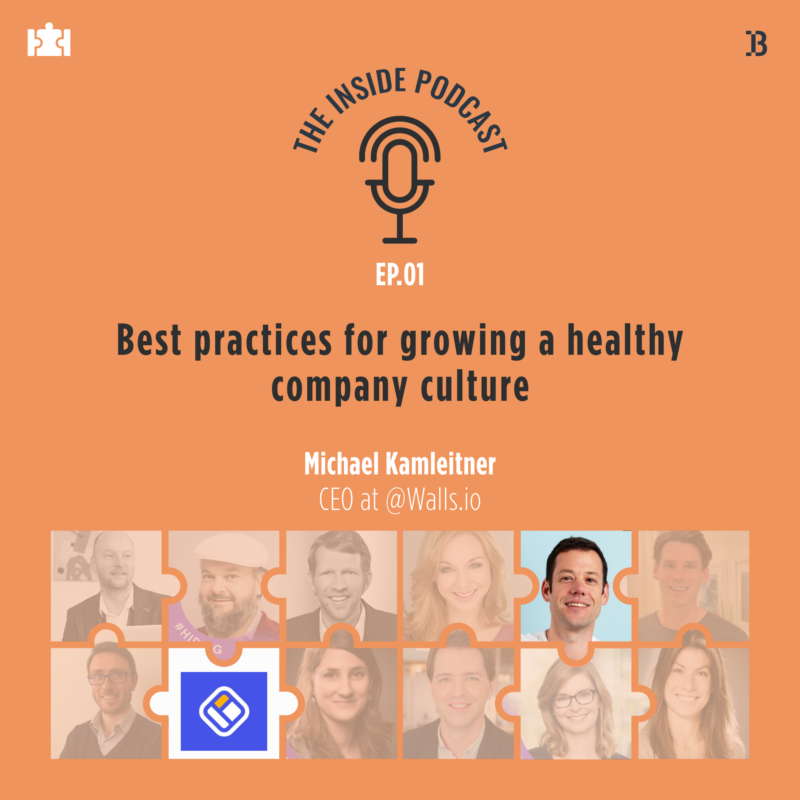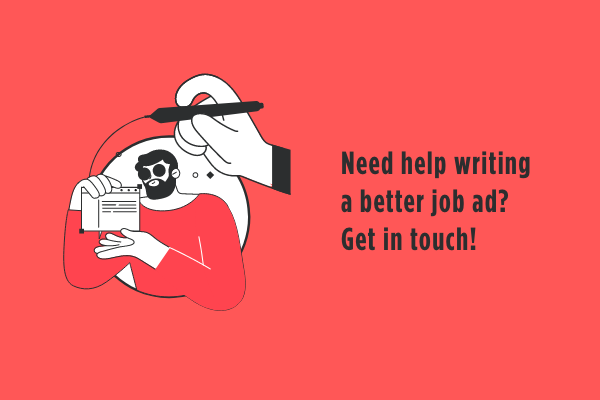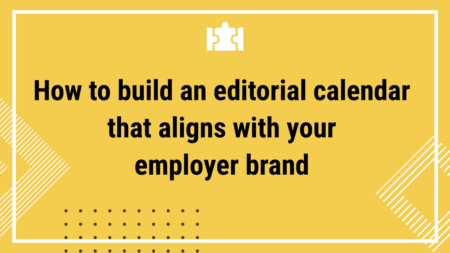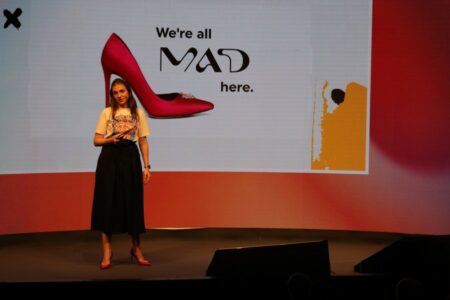Overview
Season 4 of Employer Branding: The Inside Podcast is now live! We’re ecstatic that we’re made it so far! In episode 1 of this 4th series we had a very insightful conversation with Michael Kamleitner, CEO of Walls.io on leadership and its involvement in building a strong company culture. Michael shared with us key points on the importance of maintaining organizational culture, the effects of company growth in preserving values, and a lot more. Tune in for more!
What you’ll learn by listening
- Insights on maintaining company culture as a CEO
- How does company size impact organizational culture?
- Company growth and its effects on culture: dealing with the different backgrounds of the people
- Leadership best practices: living company values is critical
- Company culture fit: a core element of building a strong organizational culture
- Getting involved in knowing your people and understanding their needs and wants
- Suitable channels for building a strong employer brand
- Focus, the key to success in 2022 at a company level
About the company
Walls.io is an all-in-one social wall solution that allows you to collect, curate, and display content in an easy-to-customize feed. You can collect content from multiple social media platforms or let your audience post content directly on your wall. You can add your custom posts to the feed and create a nice mix between content from your audience and your brand’s content. A social wall is a great way to harness the power of user-generated content and engage your audience. You can use it at private and public events, on your website or displays in shops or offices. The possibilities are endless!
Enjoy listening to S04Ep.1 of Employer Branding: The Inside Podcast!
Podcast transcription
Georgiana: Hi everyone. This is Georgiana with a new episode of Employer Branding: The Inside Podcast. Today we’ll be talking about leadership and company culture with someone whom I admire a lot and whom I’ve known for very many years. His name is Michael Kamleitner. He is the CEO of Walls.io and the founder of Swat.io. Michael, good to see you. And welcome to our podcast.
Michael Kamleitner: Hi, Georgiana. Hi, everyone, thanks for having me!
Georgiana: I have to say first that I’ve known Michael for a number of years. We also worked together. So I kind of got a very good feeling of what Michael is like a leader. And this is why I chose to talk to him today about the way he conducts the two companies that he has founded. But before we go on to that, I would like to ask you, Michael, to maybe give us a brief introduction on Walls.io. And please tell us a little bit about your current and your previous role in the companies.
Michael Kamleitner: Sure, sure. Of course, thanks. First of all, thanks for your kind words. I’m also very happy that we could reconnect after knowing each other for many years. And I’m looking forward to this session. So yes, Michael, of course, is totally fine. Most people call me Michael anyway. I did found a company called the Socialists 12 years ago that was sort of a software agency.
In the social media marketing space, I used to be a developer myself. And back then I just found it super exciting to play around with the Facebook API, which back then was brand new, and explore how you could create and distribute software on these new platforms. I was basically a geek, I still am, I would say, playing around with social media networks and out of this first company, grew to software products, as you already mentioned that the names, the first is a little bit older, is Swat.io.
And the newer one is Walls.io. Both are software service companies. They are tools in the social media marketing space. And like I said, both actually didn’t start as being their own independent companies. But both basically started out as a product idea out of this original company. And please, you have to stop me if that’s too much detail, but I think the company history, the company history maybe also is important or places some important role in how culture in both companies nowadays works; and what values we think are important. I think that all a lot of that goes back to the origins.
Georgiana: And exactly, and I’m sorry to interrupt, what I find most amazing about it is the fact that you talk about 12 years for the same company. This to me really is fantastic. Congratulations for it.
Michael Kamleitner: Again, thanks for your kind words. It’s very easy for someone when you’re a founder, a CEO, or even a manager, to live and breathe your business, almost 24/7. I would say for so many years, it’s sometimes easy to forget or to lose that kind of outside view and reflect on that. But you’re right, 12 years is an amazingly long time.
And I’m really grateful and blessed that both businesses are running well, and that we are still here after so many years and growing. So I’m very thankful for that. What I wanted to mention, too, is because you asked about my current role and that is, of course, my career. But the role of a CEO is also always changing, like you start out as a one person company, doing everything, a little bit of coding, a little bit of selling, a little bit of bookkeeping, sometimes. And then you start to grow a team. And then I don’t know, first you find some other developers who can create software better than you and then you look for some marketing people.
The role, of course, is constantly changing. And sometimes your job is to put out the fire that no one else is putting out. And that changes. And for me, of course, it changed a lot. And that’s maybe good. Maybe it’s worth mentioning, in my particular case. My role has changed a lot in recent times because I’ve been moving out of my operational duties as a CEO. I have passed on the CEO duties to my dear colleague, Johannes, very recently, actually. We announced that just a month ago and I’m still fully operationally responsible as CEO at Walls.io. My current role has just recently changed a little bit.
Georgiana: And, Michael, I know that you grew Swat.io from a few employees, like you said, right to a few 10s of employees. And actually, you did the same thing for Wall.io? How easy or how difficult was it for you to maintain the company culture, which, you know, in smaller companies is very much synonymous with the founder.
Michael Kamleitner: That’s a great question. And, and the question I’ve been thinking about before doing our interview? Well, I don’t have an easy answer. You’re right. I mean, overall, across both companies I’m glad to be working now with almost 16 team members. So that is, of course, a significant change, compared to the one man show.
And regarding your question, how have I been able to maintain the company culture? I was thinking about that. Maybe it’s not so much about maintaining, I’m pretty sure our company culture has evolved quite quite strongly in these 12 years. You must imagine, yes, I started as a one man show. And then we hired some more developers. Now, of course, these developers were very similar to me. Similar age, similar background, of course. So in the first, I would say, three, four or five years, we had like this extremely homogeneous group of people who were all geeks, of course. So that, of course, has completely evolved.
Today, we are super happy to have almost reached a balance between male and female. Almost, we’re not there yet. I’ll be honest. But we are getting there. And I forgot how many nations our team members are coming from. It’s a lot of people from all over Europe, all over the world, really. So a lot has changed. But of course, still, it’s something completely different. And so I believe that the company culture, in fact, has definitely evolved in the course of these 12 years. I would say, in a good way; some core values that have survived these changes and are still valid even after all those 12 years.
Georgiana: Well, with this being said, we’ve practically covered the question on diversity.
Michael Kamleitner: I will be completely honest with you, Georgiana. Easy times and difficult times, up to a certain size. And I’m just guessing, but I think it has to do with the size of the company. After a certain size of like 10-15 team members, I found this very natural and easy. Company culture was something that was coming, of course, mostly out of me originally. But since we were quite well, people were working with us for quite a long time. So they were used to the way we are doing things. The culture formed almost automatically. I found it very easy and comfortable. At one point, I think I found that it got more difficult. Maybe because there were more team members joining in a shorter time.
We were growing faster in terms of headcount. At one point, we got more diverse, from different backgrounds, not just in gender, but completely different backgrounds; people with families versus singles, and at one point it was just becoming clear that we can’t take this automatic company culture for granted anymore.
It became clear that we have to actively communicate our values and our company culture, and make sure that everyone even knows what they are. What used to be automatic suddenly became an effort or something that we had to invest in consciously. And well, like I said, I want to be honest, at first it feels strange. I mean, why can’t it work automatically anymore? And why do we suddenly need to do an all hands workshop where we talk about company values, etc. So that felt like, we have to do this. At first, that was difficult. But of course, it was also super easy for me to understand the mechanisms behind it, and the reasons why it’s now necessary to do such things.
Like I said before, growing faster, having way more people with diverse backgrounds, people coming from other countries. So of course, in the end, I understood why this is necessary. But it was not easy.
Georgiana: For sure. And like you said, some people were with you, or at least a few years ago, many people have been working with you for quite a long time, right? Which is something that not many companies can say. And I don’t know if you’ve thought about it actively or if you can identify a certain leadership style for yourself. But maybe if you can share with us just one or two best practices that maybe some other leaders could follow.
Michael Kamleitner: I think that is probably the most difficult question to answer. I mean, first of all, I would like to emphasize and repeat that I’m really very proud, happy, and thankful. Proud that several people here in the company have been working with me for as long as 12 years, 11 years, 10 years. And that’s really something! Whenever I’m in doubt about myself, I can remember that something must be right. But the second part of the question is where it gets tricky.
And I had a good chance to think about that. A few weeks ago, my SWAT team brought me very heartfelt farewell notes when I stopped by MSU. On LinkedIn, and I was, of course, very happy to read some notes from people who have been with us for so long. But to try to answer your question, I think what helped me a lot was being consistent and living the values that I actually expect from my team.
And that may sound like a generic answer. But what I mean by that is putting out venues is a nice thing. But it only makes sense if you’re giving them exactly if there’s a chance that your team member, your team also sees that you’re actually believing and, and leaving that and I think is showing this consistency over a long time. It’s a good foundation to be working with people for such a long time.
So that would work for any CEO or any manager that’s quite generic. I believe it’s true. What worked for me, and that will not work for everyone, is that I think I brought a reasonable mixture of serious work ethic and also expectations of what I expect from my team, combined with a relatively easy to approach way of doing things. And that might not work for everyone. But I think it’s a personal treat. I’m happy and I think I can say I have that. But I think that was important for me as well. Of course, if there is a quality that your team actually cares about and shares things is important. I mean, not everyone wants to do it my way as others prefer to work in a super serious work environment where there’s no I.
It’s funny that this comes to my mind now but in fact, I remember, quite recently we had a new team member joining our operations team. In Austria, the first month is like a trial month. So within the first month, both sides can stop without any reasons and without any consequence. And actually, the new team member decided to stop after the first month. I can;t remember the exact words but I can tell you what I’ve heard from my team was that she didn’t feel so well in such an easy going atmosphere or something like that. She really said something like this, that she would expect a more stringent work environment. I must say, fair enough, not everyone is the same. There are exceptions to that.
Most people would prefer a relaxed and easygoing environment, but still a demanding atmosphere. So clearly the mission must be achieved and must be clear. And we expect a lot from our team, in terms of output, in terms of motivation, everything. But that’s no contradiction for me to do that in a fun, comfortable, relaxed environment. And I guess that is something that I managed to provide for years.
Georgiana: And if you ask me, honestly, I think it’s one of the reasons for the success of the company, because so many organizations nowadays, and I’m not talking necessarily about the big ones, even smaller ones are so stiff. They take themselves too seriously. And I find that sometimes, I find it ridiculous that you work for 8,9, 10 hours a day, and you need to have at least a little bit of fun while having it.
Michael Kamleitner: Yes, of course, absolutely. I guess this is probably also something that has been changing a lot in the last 10-20 years. When I started to work, and that was quite a long time ago, I don’t even want to say that it was definitely different. So if I would imagine our company culture like 20 years ago, that’s when I started to work, then it would have been like a complete, I would say an outlier, something that you won’t find a lot. I think nowadays that is much more the standard way, at least for smaller companies. In our industry, definitely. I guess we also have to be probably all a bit in our own tech startup marketing bubble. Might be quite different outside, right?
Georgiana: Which is why the little anecdote you told me surprises me. But like you said, not everyone is the same.
Michael Kamleitner: Yeah, I mean, I was very surprised. To be honest, I don’t know the candidate’s background now. Because like I said, I was not involved anymore. But it would be interesting to see where they have been working before. Maybe they came from a bank or I don’t know, but it was very interesting.
Georgiana: Could be and, Michael, you mentioned the importance of value. That was previously in our discussion. I’m wondering, is there anything else that’s important when you think of company culture or when an organization should try to work on developing their company culture?
Michael Kamleitner: I’m not exactly sure. If company values are the most important thing inside the company.
Georgiana: For example, if they are the most important thing or you believe that something else is polishing the culture?
Michael Kamleitner: I mean, it is an interesting question. I think for many people who are looking to be employed and looking for a job. I think that is really one of the if not the most important criteria for them. Whether they want to stay for a long time at the company or not. I am sure there are exceptions there. I’m sure there’s a segment of people who will value income overall.
I think you can see that in the United States, in the startups and tech scene, people are dropping every other year, basically. You can always chase the next bigger paycheck, despite culture companies. That’s like the dream world of culture anyway, theoretically. And still, after two years, they switch companies because someone else is offering them more pay. So yes, there’s definitely people who are valuing income over company values.
But I think in our realm, in the companies that I have gotten to know, people probably made you company vacuums the most over definitely over income. I think as a strong second, maybe there are people, of course, who are very much interested in the challenge, like having a challenging task, challenging job, per se, that is also very important. It’s hard to say which one is more important. I think that might be very personal.
Georgiana: That is right. And now I’d like to get back to some matters, which are, I wouldn’t say more actual, because all of them are important and actual, but to the corona times, so to say. And I was really curious to know if you guys work remotely, or in a hybrid mode model, or in the office.
Michael Kamleitner: That’s a very interesting question. I mean I should at least try to be honest. So that the truth is until 2020, we have been in person only company. So we had no remote. We only had people who wanted a few days per year to work from home. So we were very, very strict in person company, to be honest, mostly because of me; because that’s the way I work and the way I operate. So that means when, and yeah, in recent years, there was a little pushback. Sometimes people were asking, hey, can we do more home office days or country, etc. And I was quite stubborn and didn’t let that happen.
Again, mostly because it is my preferred way to work. And I was like, imposing or thinking that must be the best way for everyone, basically. And then, of course, March 2020 happened. Suddenly, I couldn’t, I had to change my position quite fast. Because I couldn’t have my stubborn ways anymore. And suddenly, everyone was working from home. And of course, that was a very intense and quick learning process for me, because within a few days or weeks, I luckily and happily realized that a lot of things work very well remotely.
Most of the things actually worked very well, when switching to the full remote mode. So yes, that’s what you do. As a founder, as a CEO, you have to be flexible and change your long held opinions. Also very fast I did that and I saw that it worked. And of course, I saw the benefits of it. And this means both companies are now in a mode where people can choose how they want to work. So what that means is we have a good number of team members who are fully remote, they rarely come to the office. We have team members who come to the office every day. A few of our team members come to the office twice or three times a week. So we are currently supporting the whole spectrum. Yes, that’s the answer to that.
Georgiana: Okay, and continuing on the leadership part, and actually not necessarily on the leadership part. I’m just curious to know how involved you are personally in getting to know your people and understanding their needs and wants.
Michael Kamleitner: That is something that is getting more and more difficult with the size of the company, growing the company. That was, of course, super easy while we were all sitting in the same office. So that’s also more difficult in a remote or hybrid situation. So it is kind of hard for me. And what we do is very close and regular exchanges with my direct reports. So that’s, of course, mostly team leads. But I also have some direct reports, which are just doing their work as a team member.
And of course, with them, I’m very involved. And I make sure that all the managers and all the team teams have such an exchange with their manager, so that everyone in the company has someone to turn to talk about their needs and their wants. But I want to support structures in both companies that allow everyone to have someone to turn to. That is, of course, the direct reports. And I do have kind of an open door policy. So if a team member, for whatever reason, wants to get in touch directly with me, they do. That’s especially the case for those who are with us for five plus years. Sometimes they come directly to me. That’s good, of course. And we also do, we also do use technology for that. So we are using a software tool, like a survey tool, pulse survey that allows team members also anonymously to share their feedback and their wishes and needs.
Georgiana: So you’re also using tools. Okay. And since you are coming from a very strong social media background, I was wondering, in your personal opinion, what’s the most suitable channel to build a strong employer brand?
Michael Kamleitner: I would say LinkedIn, in terms of social media channels. I think, for larger companies, it might even be running their own employer branding communities or websites. But for most companies that are not so huge, not so big, I think that is LinkedIn.
Georgiana: Okay, we are slowly approaching the end of this episode. So I was wondering, what does Michael expect from this year professionally? Well, I mean, because it’s been a very, a year full of change.
Michael Kamleitner: Yes, yes. Change is the only constant here. So like I said in the beginning, since my roles have been now refocused and changed. I’ve dropped out of my day-to-day operational CEO job. Basically, I retired from Swat.io, I’m still the owner and that means I’m still involved on a strategic level, but I don’t have any day to day tasks here. That means I did that for one reason, the only one I did was to be able to better focus on my other company, Walls.io. What I hope and expect from 2022 is that this increased focus will bring me more success on the company level, but also more happiness and calm on the personal level. But let’s put it like that. The good news is I have already started to feel that this has happened since I now have more time. I really can see how that feels. Just feels good.
Georgiana: I can imagine it’s difficult to always split your focus and your passion and your drive into parts.
Michael Kamleitner: It was a good time to do it now. I mean, that’s my biggest expectation for me. For me personally, for Walls.io. Like I said before, and maybe it sounds dramatic. I’ve retired from Swat.io, but I’m still so much interested in the company and in the investment of the company. My second expectation for 2022 is to see the proof or see that it comes into reality. What I believe was a good decision in finding the right management team for Swat.io, with Yohannes, who has been working with me for I think, 11 years, but also extending to the rest of the management team, which, together with Johannes I put into place so that we can make sure actually, that there is no downside from me, stepping back. And so that’s my second biggest expectation from 2022, that all this good preparation, this good work, will bear fruit and that Swat.io will thrive even faster than when I was involved directly.
Georgiana: Nice. And to just to conclude this episode, Michael, one question that I ask all of my guests. What is one thing, let’s call it resource, but it can be anything for some people. One resource that has helped you in your career so far.
Michael Kamleitner: I think, regular exchange with other founders and CEOs. And that sounds trivial, of course, but for me, it isn’t. In my specific case, what really helped me tremendously is a meet up software service from founders here in Vienna, Austria. Where, like, for me, what is key here is that the people to exchange with Are you either they are right now in a similar situation, or ideally, they are one or two steps ahead. Like they are coming from a similar industry, like they’re all software businesses, maybe they are all software as a service, so they know exactly what problems I have to deal with. And ideally, they are one or two years ahead of me and have already found out how to solve some of these problems. So this regular exchange with like minded founders is, I would say, the most valuable help that I had in my career so far.
Georgiana: And I’m super happy that you mentioned this because I think too few times, we will reach out to our peers and to peer groups. And in the end, I don’t know the sort of support groups in the businesses we’re in, and there’s so many resources and so much help that can come from like minded people.
Michael Kamleitner: Yes, absolutely. I mean, of course, that’s something also you have to consciously invest time, creating your network, and also making sure that you are available to help those people and probably will have to help three times and then you get held back one time. I don’t know. So you have to pay forward, also. And that’s fine. I mean, it’s totally worth it.
Georgiana: So nicely said and so nice to conclude our meeting today. Thank you so much, Michael, for talking to me. I wish you all the best for both companies, of course. And we hope we can meet again in person at some point in our venture.
Michael Kamleitner: Thank you, Georgiana. It was a pleasure. And I wish the best also to you and to Beaglecat. I hope that 2022 also brings back more traveling and then maybe we see in Berlin or in Vienna.
Georgiana: Super. Thank you. Bye bye.
Michael Kamleitner: Bye. Goodbye.
This was Employer Branding: The Inside Podcast. You can find our podcasts on Spotify on Apple podcasts and content on employer branding-related things on employerbranding.tech. Until the next time, stay tuned.







